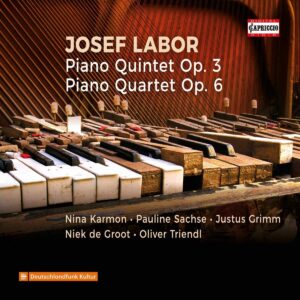If you’ve never heard of Josef Labor (1842-1924), you’re not alone. I only learned about him because he made what is considered to be the rarest piano recording in existence, containing a portion of the Beethoven Op. 10 No. 3 sonata slow movement. Labor’s very free yet intensely expressive playing provides a tiny glimpse into what Beethoven interpretation might have been like in the mid-to-late 19th century. Blind from the age of three due to smallpox, Labor studied at the Vienna Conservatory and befriended Brahms and Richard Strauss. Violinist Joseph Joachim greatly admired Labor, and collaborated with him during the 1860s. King Georg V of Hanover appointed Labor as Royal and Imperial Court Organist. After the King’s death, Austria’s wealthy Wittgenstein family (including the famous brothers Ludwig the philosopher and Paul the pianist) became Labor’s principal benefactor, and arranged for his compositions to be published.
One can describe Labor’s compositional style as the ultimate in fake Brahms and fake Schumann. You won’t get memorable tunes, yet Labor’s sophisticated handling of intricate textures, deft rhythmic interplay, and splendid ear for harmonic detours hold more than passing interest. The Quintet’s Andante stands out for its long melodic lines supported by full-bodied pizzicato underpinnings (the use of double bass gorgeously fills out the bottom end), and for the way in which the ideas evolve into more sustained, contrapuntally involved realizations by the end. Each work’s outer movements aspire to and achieve symphonic grandeur, propelled at times by soaring string unisons and momentum-generating pedal points.
The musicians may not be advertised as a collective group, yet the performances sound impressively polished and integrated in regard to scrupulous ensemble, impeccable solos, and passion at every turn. In other words, these interpretations reflect (and forgive my terrible pun) a “Labor of love”. A must-have release for collectors drawn to the chamber repertoire’s obscure-yet-worthy byways.
































